Wall Street isn’t the only road to retirement. Some prefer an investment with a bit more curb appeal: real estate is their 401(k).
These retirees say they feel more secure building a nest egg that has walls, doors and kitchens. Though many people count on the stock market to fund their future life, real-estate retirees prefer the steady rental income and tax breaks of being landlords. Some enjoy rehabilitating properties.
A 10th of households in the U.S. with someone 65 or older earned rental income in 2022, compared with 7% of households of people under 65, according to an analysis of Federal Reserve data by Boston College’s Center for Retirement Research.
Holding real estate does mean work in retirement. Rental units sometimes sit vacant. Urgent repairs and tenants who miss payments or cause damage bring headaches. From property taxes to insurance, the costs of owning property are also rising.
“If you’re a landlord, it can be difficult to feel like you’re truly retired,” said Daniel Johnson, a financial planner in Winston-Salem, N.C., who specializes in retirees with multiple real-estate holdings.
Real-estate retirees say the rewards outweigh the risks. Many who are retiring on real estate today benefited from decades of home price appreciation and locked in low mortgage rates.
Four people who retired on real estate told us about the joys, anxieties and costs of living off a property portfolio.

JOSH BOTTFELD
- San Diego, Calif.
- Properties: 7
- Mortgage debt: $1.3 million
- Annual spending: $120,000
Back in 1982, Josh Bottfeld pulled money from his retirement account to buy a studio apartment in San Francisco. At 29, he had a hunch it would lead to the portfolio of properties now funding his life.
“I remember telling people that my retirement was sitting on Main Street rather than in a 401(k),” said Bottfeld, 70.
He sold the studio a few years later and plowed the proceeds into a San Francisco home he and a friend bought for $103,000, later flipping for $125,000. Bottfeld used his profit to buy a three-family house in a gentrifying neighborhood.
By 2000, he owned 15 properties in places including San Francisco, Las Vegas and Portland, Ore. When he sold a property, he often relied on a tax provision that defers capital-gains taxes when the seller purchases another real-estate investment property.
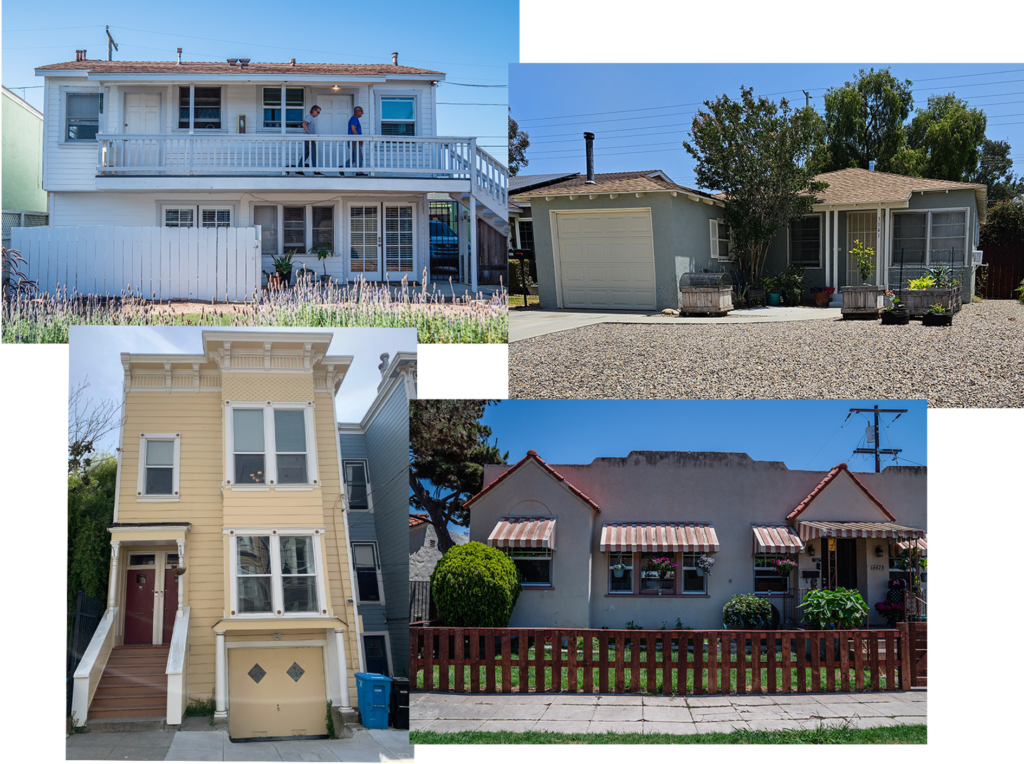
Bottfeld’s properties, one jointly owned with husband Brent Butler, include mostly multifamily units in San Diego and a yellow two-family home in San Francisco. PHOTO: ARIANA DREHSLER FOR WSJ (2); JOSH BOTTFELD (2)
When Bottfeld was laid off from his human-resources job in 1997, he became a Realtor.
He moved to San Diego in 2004 to manage a real-estate office, but quit at age 53 once he had enough rental and investment income to retire. He returned to work briefly during the financial crisis when senior living partnerships he invested in went belly up, and retired for good in 2012.
Bottfeld said he feels safer with real estate than stocks. Real estate is also a good inflation hedge, said Bottfeld, who has raised rents in recent years to keep up with rising homeownership costs.
He currently has 14 units in seven buildings, including three rentals on the San Diego property he shares with his husband, Brent Butler, 60. He pays property managers from 6% to 10% of the rent to find and vet tenants and perform maintenance.
“I could be making a lot more money if I were managing them myself,” he said. “But I don’t want to be bothered.”
Bottfeld estimates he has home equity of $8 million, net of mortgages. He has mortgages on four properties with fixed interest rates of around 3.5%.
Another $4.8 million sits in stocks and other investments, including three-month to 12-month bridge loans to house flippers that pay 8% to 15%. To protect against default, he takes liens on borrowers’ properties.
On average each month, Bottfeld said he earns about $20,000 in rents, $8,000 from bridge loans, and $3,200 in Social Security.
He and Butler have monthly expenses of about $10,000, not including business expenses, such as the mortgages. They rise around 5 a.m., go to the gym, and take their dog, Biscuit, on walks. Bottfeld often meets friends for lunch. The couple is taking a Danube River cruise this summer.
“I’m a saver and am very frugal,” Bottfeld said. “But at some point you realize you are going to have enough.”
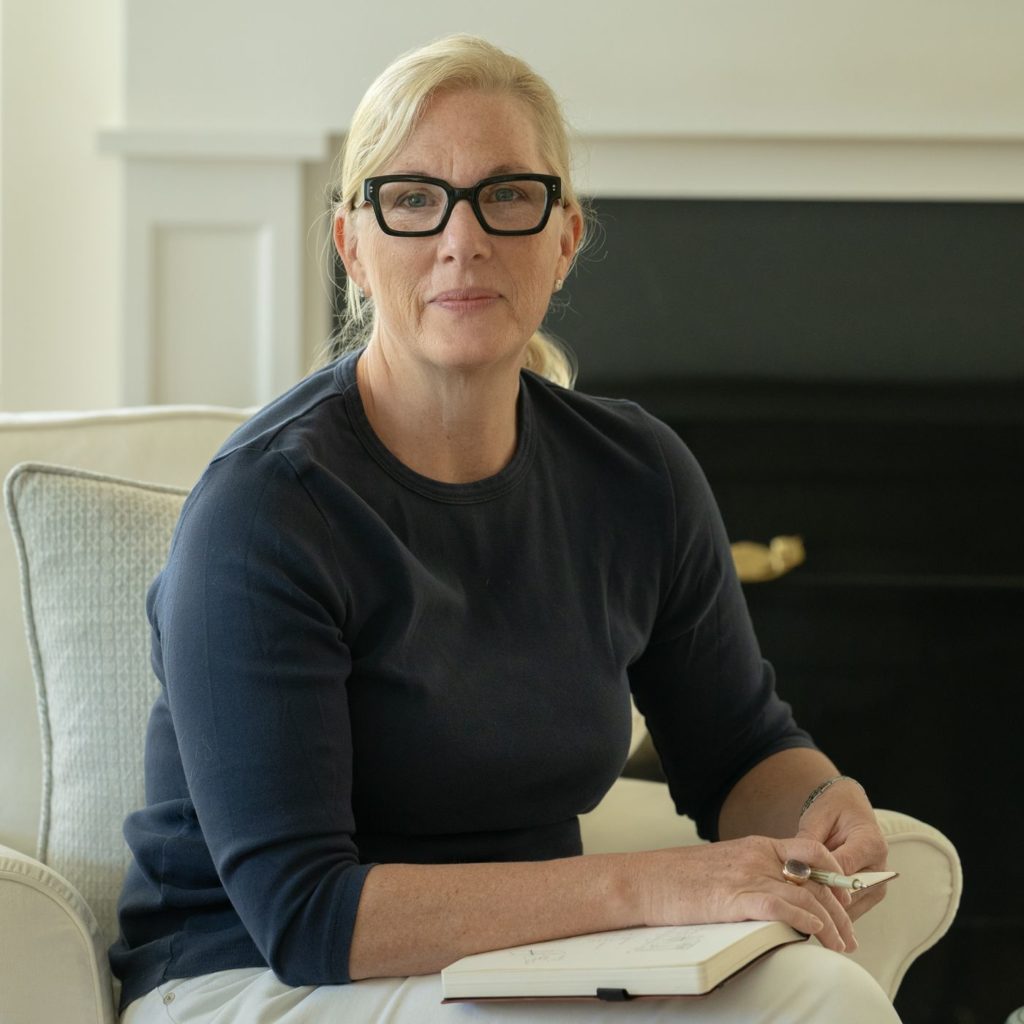
Sarah McLane has deep ties to Nantucket, which she first visited as a teenager. She plans to split her time between Nantucket and Stowe, Vt. PHOTO: TUCKER FINERTY FOR WSJ
SARAH MCLANE
- Nantucket, Mass. & Stowe, Vt.
- Properties: 2
- Mortgage debt: $0
- Annual spending: $100,000
Sarah McLane worked on Wall Street. But when building wealth for retirement, she invested in historic homes in Nantucket and Stowe, Vt.
She left financial services in 2017 to work for builders in Vermont and no longer tracks the stock market the way she used to. “I know real estate and construction and preservation and can add that extra value,” said McLane, 56. “In the stock market, I just can’t do that anymore.”
McLane had been saving for retirement in a 401(k) since 1998. Then in 2007 the single mother of two fell in love with a rundown 1813 farmhouse in Stowe, where she often skied with her children.
She withdrew most of her $250,000 retirement savings to finance the down payment and renovation. She paid income tax but avoided the 10% early withdrawal penalty since she used the money for her home.
“Rebuilding the 401(k) wasn’t a priority,” said McLane.
But the house was.
McLane, who lived in New York City rentals, wanted to put down roots in a place her son and daughter enjoyed as much as Nantucket, where McLane’s former husband lived. She also liked the idea of buying in a tourist town with a robust rental market.
She spent weekends stripping layers of wallpaper and refinishing the wood floors. Over time she put $2 million into the house and barn and estimates the property is now worth $3 million.
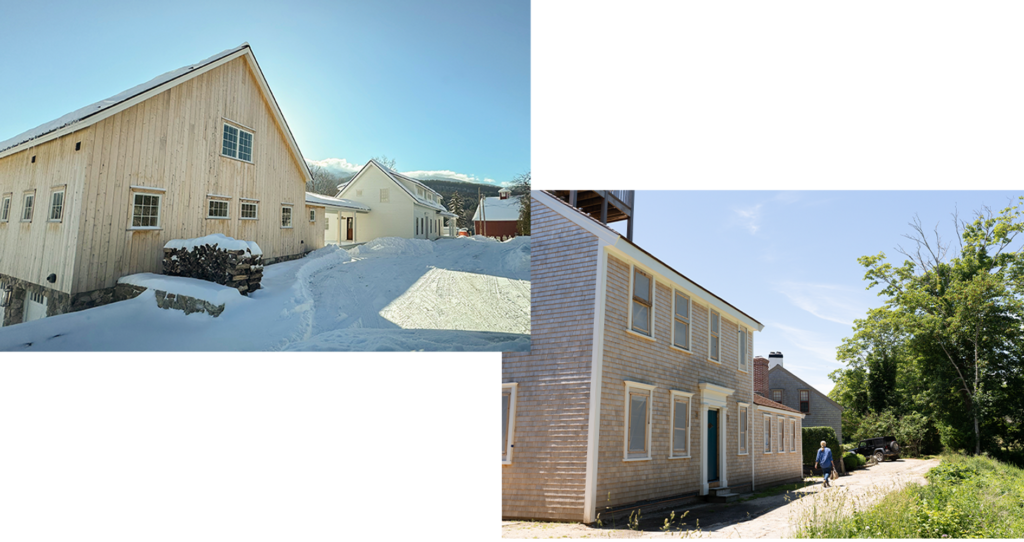
McLane is preparing to rent her Nantucket home, right, during peak tourist season starting next summer. She also owns a house in Vermont. PHOTO: FROM TOP: SARAH MCLANE, TUCKER FINERTY FOR WSJ
From 2017 to 2019, McLane worked in project management for builders and did some interior design. Vacationing in Nantucket, she started dating her second husband in 2018.
McLane purchased a historic house there for $1.6 million and invested $2.5 million in renovations, with the goal of renting it.
McLane, recently single again, is working six days a week alongside carpenters and subcontractors to get the place ready. She stripped and repainted the millwork and reglazed the 18th century window panes herself.

McLane enjoys working with subcontractors on her Nantucket property. She did some of the renovations on the Vermont farmhouse she bought in 2007. PHOTO: TUCKER FINERTY FOR WSJ
She will live in Vermont in the summer so she can rent in Nantucket during peak tourist season. She hopes to net $250,000 after expenses including property taxes and insurance, more than enough to cover her $100,000 annual expenses. She also has $1.3 million in the bank earning about 6% interest.
In winter, McLane plans to rent her Stowe house, which fetches enough rental income to cover the property’s expenses.
From fall to spring, she hopes to live in Nantucket, which she considers an ideal place to retire. Because her house is in town, she can walk to stores and the library. It isn’t far from Boston, where her 9-month-old grandson lives.
“As I get older, I can go to the historical society and read ship logs from the 1880s.”

Bryan Haltermann initially thought he wanted to be a history teacher. He eventually decided to invest in historic buildings instead. PHOTO: DAVID WALTER BANKS FOR WSJ
BRYAN HALTERMANN
- Augusta, Ga.
- Properties: 12
- Mortgage Debt: $2 million
- Annual Spending:$150,000
Bryan Haltermann retired about two years ago. He still goes to the office five days a week to check on his holdings.
The former commercial real-estate developer enjoys spending an hour or two each morning responding to emails and chatting with the staff of four who manage his properties.
Then Haltermann, 70, usually plays court tennis, followed by lunch with friends.
It is a leisurely pace compared with the long days he worked buying, renovating and managing residential and commercial buildings in downtown Augusta, Ga.
At the height of his career, he owned 20 properties. His business began around 40 years ago when he and a partner bought a 10,000-square-foot building for about $50,000. He estimates this building—which he still owns—is now worth about $500,000 thanks in part to renovations and appreciation.
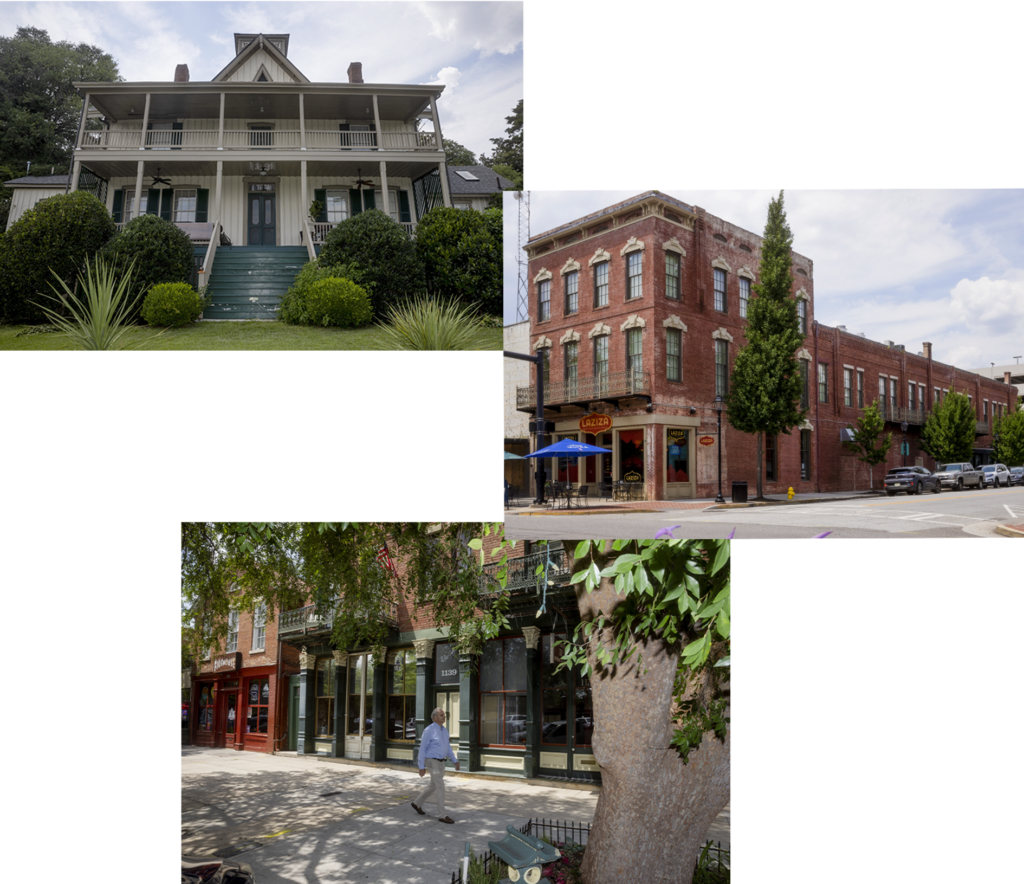
Haltermann received tens of thousands of dollars in federal and state tax credits over the years for restoring historic buildings. PHOTO: DAVID WALTER BANKS FOR WSJ (3)
Haltermann who had thought about becoming a history teacher when he was in college, ended up specializing in historic properties. He received tens of thousands of dollars in federal and state tax credits over the years for restoring these buildings.
He bought out his business partner’s share of the buildings about 15 years ago. When he retired a few years back, he sold 10 buildings for a total of about $10 million. He invested the $5 million profit.
He estimates his remaining rentals, plus his house and vacation home, are worth another $5 million. He owes $2 million in low-rate mortgages on the rentals. Rent covers his mortgage payments, taxes and insurance. He fully owns his home in Augusta and a vacation home near Hendersonville, N.C.
He and his wife, Alicia Haltermann, spend about $150,000 a year, or $50,000 a year more than they spent before retiring, with much of that on travel. Favorite recent destinations include Italy and Spain.
The couple each like their alone time and make an effort to pursue their own interests, typically spending mornings and most afternoons apart. The Haltermanns then meet back up around 4 p.m. when they make dinner plans.
He has no plans to buy more real estate.
“Higher interest rates and higher prices make it less appealing to buy these days,” he said.

David Zach is counting on rental income from small homes to help fund his retirement. PHOTO: JANE HAHN FOR WSJ
DAVID ZACH
- Sierra Madre, Calif.
- Number of Properties: 4
- Mortgage Debt: $850,000
- Annual Spending: $66,000
David Zach put his entire retirement savings in real estate.
The mostly retired entrepreneur said he feels no need to invest in anything else. He dabbled in stocks two decades ago, but wanted tangible wealth.
“I chose not to invest in things I didn’t understand or couldn’t touch,” he said.
At 63, Zach’s holdings are concentrated on three lots that he owns in Sierra Madre, Calif. Along with his home, this includes a nearby rental property with a house and smaller home. Zach is in the process of having another accessory dwelling unit, or ADU, built on the same property.
Having his rentals in one location keeps things simple. He earns about $7,000 a month in rental income from the home and existing small home combined. He expects to collect about another $2,000 a month in rent once the other ADU is finished this fall.
Zach estimates that his properties will be worth about $3.3 million. He owes about $850,000 in low-rate mortgages, and has no plans to pay off the debt anytime soon.
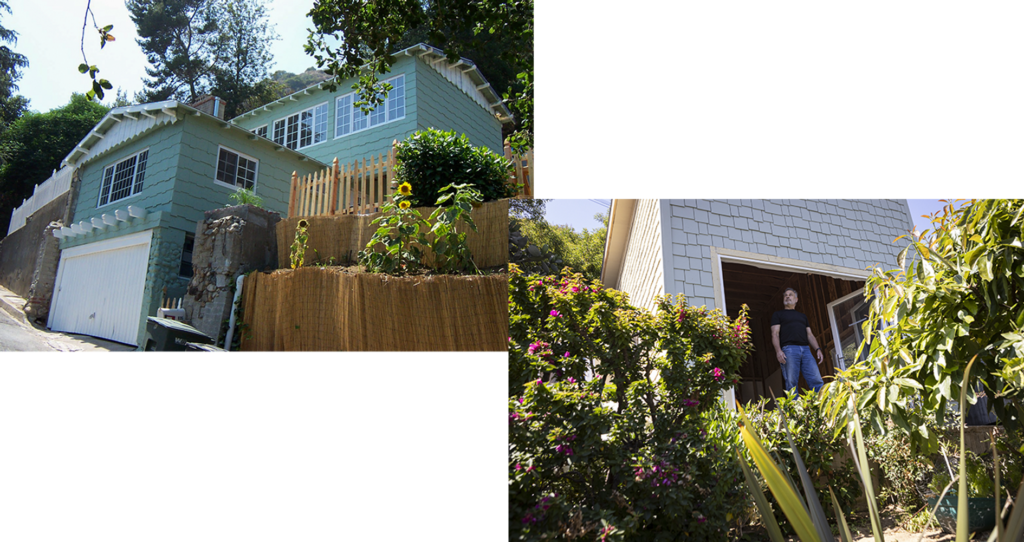
Zach owns several properties in Sierra Madre, Calif. He is in the process of building another unit. PHOTO: FROM TOP: DAVID ZACH; JANE HAHN FOR WSJ
He earns another $84,000 a year from his business selling shower parts, which he works at about 10 hours a month. He spends about $5,500 a month including mortgages, property taxes and food.
Having his money tied up in housing is risky, he acknowledges. About 16 years ago, he bought another home in Sierra Madre that he planned to renovate, expand and rent, but lost it to foreclosure when the permits didn’t come through. The ordeal meant years of stress atop $300,000 in losses, including legal fees.
He resolved to keep his real-estate footprint small, a wise decision given that inflation and labor shortages doubled the cost to build the ADU to $100,000.
Zach recently canceled a new car he ordered due to the ballooning construction cost—he would rather keep driving his two older pickup trucks and SUV instead of taking on more debt.
In addition to funding his retirement, the divorced father said the rental properties will be an inheritance for his two adult children.
He gives the same advice to them that he once received: “Buy the worst property in the nicest neighborhood that you can afford,” he said.
Write to Veronica Dagher at Veronica.Dagher@wsj.com and Anne Tergesen at anne.tergesen@wsj.com


